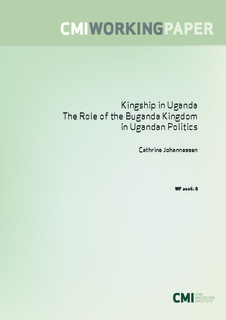| dc.contributor.author | Johannessen, Cathrine | |
| dc.date.accessioned | 2008-02-19T08:07:57Z | |
| dc.date.accessioned | 2017-03-29T09:13:01Z | |
| dc.date.available | 2008-02-19T08:07:57Z | |
| dc.date.available | 2017-03-29T09:13:01Z | |
| dc.date.issued | 2006 | |
| dc.identifier.isbn | 82-8062-147-4 | |
| dc.identifier.issn | 0804-3639 | |
| dc.identifier.uri | http://hdl.handle.net/11250/2436003 | |
| dc.description.abstract | This article aims at providing a framework to understand the role of the
Buganda kingdom in contemporary Ugandan politics, and more specifically how the Buganda question has influenced political debates in Uganda since its restoration in 1993 .
Since the restoration of traditional leaders in Uganda in 1993, the consent of the Buganda kingdom has served as an important support-base for politicians running for office both in the 1996 and 2001 presidential elections. In this sense, the Buganda kingdom has managed to influence national politics despite of its cultural character, and has re-entered the political arena as a significant pressure group more than thirty years after its abolition. The issues debated prior to the elections in 1996 and 2001in particular related to Buganda’s quest for self-determination through a federal state structure. | |
| dc.language.iso | eng | |
| dc.publisher | Chr. Michelsen Institute | |
| dc.relation.ispartofseries | CMI Working paper | |
| dc.relation.ispartofseries | WP 2006: 8 | |
| dc.subject | Politics | |
| dc.subject | History | |
| dc.subject | Buganda | |
| dc.subject | Uganda | |
| dc.title | Kingship in Uganda. The Role of the Uganda Kingdom in Ugandan Politics | |
| dc.type | Working paper | |
